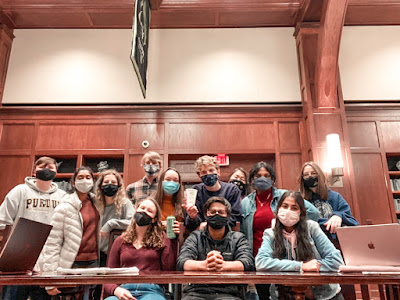My Summer Research Experience + 3 Tips for Getting a Summer Research Position
After completing my summer research internship virtually last year (you can read about it here), I was ecstatic to finally get to spend my summer at the University of Pennsylvania in Philadelphia, Pennsylvania. As someone looking to pursue a Ph.D. after graduation, doing research over the summer is a great way to dive into a project and get a feel for what kind of work I want to pursue in graduate school.
 |
| Kat in front of her research lab |
This summer, I was lucky enough to participate in a research experience through the Center for Engineering MechanoBiology, which is a consortium that focuses on advancing the field of mechanobiology. I worked 40 hours a week in the lab, where I would run experiments, read current literature in my field, or work on my communication skills through writing abstracts or creating presentations. I was also able to take on my own projects, which helped me grow as a scientist and engineer. My summer research experience solidified my interest in pursuing graduate school and my career as a scientist.
Interested in pursuing research yourself? Here are my top 3 tips for applying for research programs!
1. Identify your interests and potential faculty to work with.
Depending on how much experience you have, it can be hard to know what kind of research you are interested in! The nice thing about summer research is that it lets you get a taste of a field to decide whether or not it matches your interests. Thinking about what classes/topics excite you the most can be a way to identify fields that you may want to consider. Once you have an idea in mind, look through the faculty lists of departments of the schools you are interested in to see what research is happening at that university. Once you have decided on some professors that you would like to work with, reach out to them! The Purdue Office of Undergraduate Research has some great tips for contacting professors.
2. Pick programs that match your interests.
One thing I learned when looking for a summer research opportunity was how many different programs there are! While there are more general ones such as SURF (Summer Undergraduate Research Fellowships), there are also more specialized ones such as CEMB, which is the one I did at UPenn. There are tons of resources online for finding programs, such as the Office of Undergraduate Research and the National Science Foundation website, which allows you to see opportunities at various universities. If you are interested in doing research at a specific university, you can also check out their website for more information.
3. Ask for feedback!
One of the most useful things I did when preparing my application for summer research programs was reaching out to others for feedback on my statements. I looked for feedback from my graduate mentor and faculty mentor, but the Purdue OWL is also a great resource for getting advice on writing these statements. I know it was scary for me to ask for feedback on my application, but it helped me put my best foot forward and land the summer research opportunity of my dreams!
If you have questions, comments or want to find more about undergraduate research, tag us, leave a comment, or follow us!
Kat Kerr, Biomedical Engineering 2021
WE Link Leadership Team
Stay Connected With Purdue WIEP!
Facebook: Purdue Women in Engineering
Twitter: @purduewiep
Instagram: @purduewiep
Blog: purduewiep.blogspot.com
Email: welink@purdue.edu
Use the hashtag #PurdueWIEP on Facebook, Instagram and Twitter!



Comments
Post a Comment